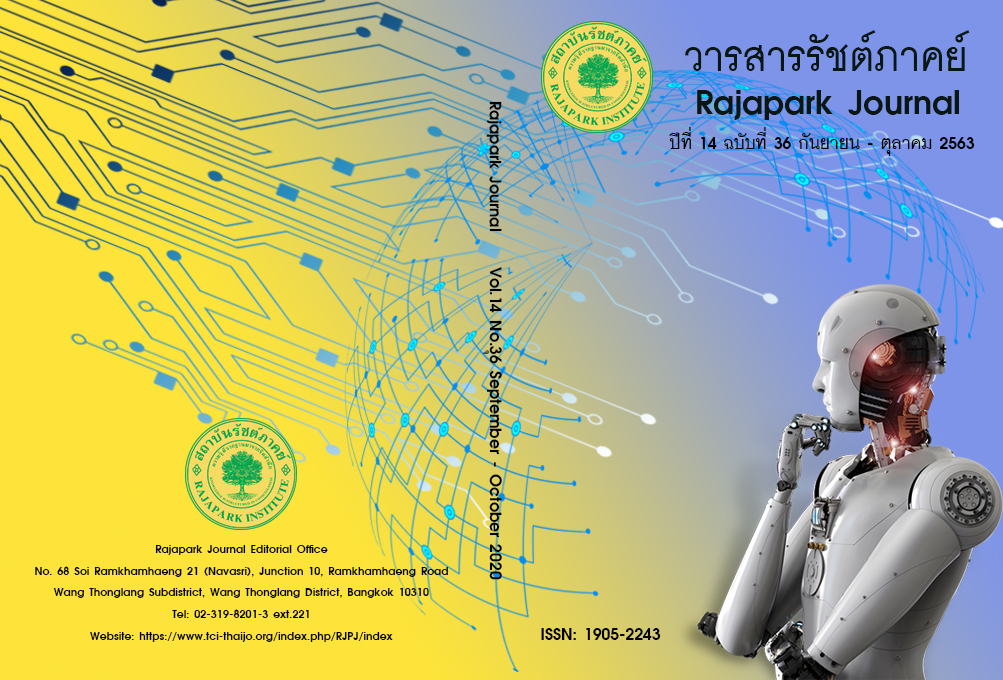Quality of Life for the Elderly in Bangkok Metropolis
Main Article Content
Abstract
The purpose of this research was 1) To study the social welfare of elderly people which influences their life quality in Bangkok metropolis; and 2) To compare the life quality of aging people in Bangkok metropolis by classifying the individual attributes. The researcher applied mixed methods research approach in this study which comprises of quantitative research method by exploring individual data of the elderly living in Bangkok areas. Questionnaires were used as the tools to investigate data of 400 participants who are the elderly being over sixty years of age and live in Bangkok metropolis. Descriptive statistic and inferential statistic were applied to analyze the data. Furthermore, the researcher employed a qualitative research method by analyzing the data in the official government document and the data from in-depth interview of 25 people concerned with managing the social welfare of senior citizens and those who use social welfare. The result obtained 1) the life quality of the elderly people who live in Bangkok metropolis in respect of physical and psychological aspects that comprises the social welfare concerning the employment significance of 0.01. 2) The different individual attributes that the elderly have, in concordance with gender, age, marital status, living status, education level, income, occupation, and number of children that differentiate the life quality of the aging people in Bangkok metropolis were statistically significant at 0.01 Nonetheless, the residence factor in different areas does not indicate the link with the life quality of the senior citizens. To improve the life quality of the elderly, the government sector particularly Bangkok sector and the ministry of social development and human security should enhance the important actions, for instance, providing medical hub in Bangkok sector to supporting the alternative medicine and enhancing the use of various technologies to prevent the disease and foster the health. And using social media to build the comprehension and the cooperation with the government sector, the state enterprises, as well as the civil society to administer the task about the elderly.
Article Details
Views and opinions appearing in the Journal it is the responsibility of the author of the article, and does not constitute the view and responsibility of the editorial team.
References
Claudine Burton-Jeangros & Dorith Zimmermann-Sloutskis. (2016). Life satisfaction trajectories of elderly women living in Switzerland: an age–period–cohort analysis. Cambridge Journal, Ageing & Society, 36(1), 106-132. DOI: https://doi.org/10.1017/S0144686X14001044
Foundation of Thai Gerontology Research and Development Institute (TGRI). (2017). Situation of the Thai Elderly 2016. Nakhon Pathom: Printery.
Hyde, M., Wiggins, R. D., Higgs, P., & Blane, D.B. (2003). A measure of quality of life in early old age: The theory, development and properties of a needs satisfaction model (CASP-19), Aging and Mental Health, 7(3), 186-194. DOI: 10.1080/1360786031000101157
Kilner, A. J., & Janes, E. F. (1997). Intensive care in the elderly. Current Anaesthesia and Critical Care, 8(3), 120-125.
Luis Miguel Rondón García & Jose Manuel Ramírez Navarrro. (2018). The Impact of Quality of Life on the Health of Older People from a Multidimensional Perspective. Journal of Aging Research, 9, 1-7. DOI: 10.1155/2018/4086294
Manprasert, S. (2010). A Study of Effects of Demographic Change on Consumption Patterns of Thai Households. Bangkok: The Thailand Research Fund.
Miller, Carol A. (2009). Nursing for Wellness in Older Adult (5th ed.). Philladelphia: Lippincott Williams & Wilkins.
Morag Farquhar. (1995). Elderly People's Definitions of Quality of Life. Social Science & Medicine, 41(10), 1439-1446. https://doi.org/10.1016/0277-9536(95)00117-P
Ofstedal, M. B., Reidy, E., & Knodel, J. (2004). Gender Differences in Economic Support and Well-Being of Older Asians. Journal of Cross-Cultural Gerontology, 19, 165–201.
The WHOQOL Group. (1995). The World Health Organization Quality of Life assessment (WHOQOL): Position paper from the World Health Organization. Social Sciences & Medicine, 41(10), 1403-1409.
United Nations, Department of Economic and Social Affairs. (2015). The World Population Prospect: 2015 Revision. Retrieved from https://population.un.org/wpp/Publications/Files/WPP2015_Volume-I_Comprehensive-Tables.pdf
Wanichbancha, K. (2010). Advanced Statistics Analysis with SPSS for Windows. Bangkok: Department of Statistics, Faculty of Commerce. Chulalongkorn University.


